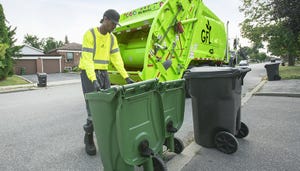Waste, Recycling Trends to Watch in 2020 (Part Two)
The final part of a two-part series highlights industry associations’ goals for 2020.

The start of a new year is typically a time to reflect on the previous year and resolve to make improvements moving forward. As the waste and recycling industry makes its way through 2020, challenges from 2019 and even earlier on still linger.
Whether it’s keeping a close eye on Capitol Hill, debunking inaccuracies and “pseudoscientific” information or making efforts to engage the next generation of workers, industry associations are gearing up their advocacy efforts for their member companies and stakeholders in 2020.
The final part of this two-part 2020 outlook series highlights some of the industry associations’ top goals for this year.
Advocacy Efforts
There has been continued discussion for municipalities, states and federal and international governments on differentiating legitimate recyclable materials from waste management over the years.
And according to Robin Weiner, president of the Institute of Scrap Recycling Industries (ISRI), that differentiation becomes increasingly important when it comes to different regulations, legislation and trade restriction.
“I’ve been at ISRI for 30-plus years, and it has always been an issue, but I see it being an even more critical issue now and manifesting itself in many different ways and at different levels of government,” she says. “So, we are going to continue to educate, raise awareness and push wherever we can to get those distinctions into law.”
Weiner adds that another area ISRI will focus on in 2020 is the issue of compliance resources. This year, ISRI will focus on “providing off-the-shelf resources for members to help them with compliance and helping members do all they can to be responsible recyclers.”
In addition, design for recycling continues to be a key issue for ISRI moving forward. Weiner explains that it has become a key issue again as a wide variety of products enter the residential and industrial waste streams.
“We’re continuing to see new challenges, and we have taken it upon ourselves to strengthen relationships with brands and manufacturers to have deeper conversations on design for recycling and determining what it means for products to be truly recyclable,” she says. “That’s going to be a big focus for us in 2020.”
Jim Riley, chief counsel and senior vice president of government affairs for the National Waste & Recycling Association (NWRA), says a major focus for NWRA will be to continue to service member companies and represent their interests in Washington, D.C., on Capitol Hill and in the local county board rooms.
“We are really looking at ways that we can continue to be effective spokesmen for our companies,” explains Riley. “We’re always listening to them to find out what their concerns are because the various challenges that they’re facing in one place could very well spread to another. So, we want to make sure that we have positive precedent that we can point to. There’s a lot in terms of the representation for the advocacy of our members, and a lot of it is dependent on hearing from them. I would encourage our members to always feel like they can pick up the phone or shoot us an email and let us know exactly what they need.”
David Biderman, executive director and CEO for the Solid Waste Association of North America (SWANA), says that SWANA intends to continue to play a leading role guiding the evolving national conversation on recycling. That includes working with the U.S. Environmental Protection Agency (EPA), urging Congress to pass legislation supporting recycling, and collaborating with the many stakeholders in the recycling value chain.
“In particular, we will continue working with other leading associations, such as ISRI, KAB [Keep America Beautiful] and The Recycling Partnership, to push back on inaccurate assertions that recycling is in a crisis,” notes Biderman.
“An important SWANA goal for 2020 is updating a few of our certification programs,” he adds. “Although it is unlikely that the work will be completed in the current year, we hope to get this important process underway later this year for several of them.”
Debunking Inaccuracies
Bryan Staley, president and CEO of the Environmental Research & Education Foundation (EREF), tells Waste360 that one of EREF’s top goals is to continue to dispel pseudoscientific information and inaccuracies that can spread rapidly across social media.
“Today, we have seen a proliferation of information being spread on social media and elsewhere that is not grounded with any real scientific data and it goes viral. Because of the ease of how one could spread ideas, which is a very powerful thing, the disadvantage of that power is when someone is spreading poor, inaccurate or incomplete information. It could spread in a way that can take much more time to unwind and correct than it would be if the correct information were put out in the first place,” explains Staley.
“How the industry deals with those situations and how the industry points to credible information is important, and EREF has a role in that as a scientific research foundation,” he adds. “It is our job to make sure that we have that credible information on tap, and getting it out there is one of the things that we need to be doing more effectively.”
Workforce Development
As the waste and recycling industry continues to grapple with a growing labor shortage, workforce development is a major issue.
“We are seeing in our segment of the economy the issue of workforce development rising to the top level of concern for many of our members,” says Weiner. “We are doing a number of things in that area. We just released in the last month or so a new benchmarking study for our members on compensation by geographic area. We are arming them with the information they need for hiring and retaining employees. Through our chapters, we’re working with community colleges around the country for apprenticeship training programs for workers. And, in an effort to build future workers, we are continuing our K-12 partnership with JASON Learning to build recycling curriculums in schools around the country.”
One of ISRI’s internal priorities is to work with member companies to engage the next generation of workers and get them more engaged in the industry. ISRI is also focusing on providing more networking opportunities for next-gen workers and for women and minorities in the industry.
SWANA is also focusing on similar workforce development efforts.
“One of our goals in 2020 is to better engage these individuals, particularly as some of the baby boomers who have been leaders in SWANA for decades retire,” says Biderman. “SWANA’s Young Professionals group has grown to nearly 1,200 members and is the leading association forum for future solid waste industry and municipal leaders.”
In addition, Biderman says SWANA will continue to evolve its national conference, WASTECON, into an executive leadership event and will continue to make improvements so WASTECON attracts more municipal and industry leaders.
PFAS Research
For 2020, the industry expects even more attention around research efforts and the potential health implications of per- and polyfluoroalkyl substances (PFAS).
Anne Germain, vice president of technical and regulatory affairs for NWRA, says PFAS is a constant issue for NWRA because it gets so much attention both from regulators as well as legislators. NWRA released issue briefs last year concerning PFAS, and Germain believes more will come.
“We don’t see it slowing down, especially with new movies being released about PFAS,” she says. “We anticipate that will continue to be one of our focus points in 2020.”
EREF has various funding efforts around the issue of PFAS and is focused on increasing thought leadership and credible science when it comes to major issues, like PFAS.
“With a lot of the grants we have, we can always improve how we can translate that science to practical guidance that the industry can use both today and in the future,” explains Staley. “Those are major goals for us in 2020: increasing thought leadership and better awareness building of what the science is by translating that academic speak down into practical terms that the industry can use. And then we look forward to holding a couple of great technical events this year. Global Waste Management Symposium is just around the corner. And then in late 2020, we’re planning a PFAS Summit that will help further that conversation on what is the waste management industry’s role as it relates to PFAS management and how we deal with that.”
Sustainability
Arnold Bowers, business solutions director at ENGIE Impact, formerly ENGIE Insight, explains that in 2019 ENGIE restructured its business and changed its name in an effort to realign internal resources to a business unit.
“We are building out our sustainability services that we offer our clients to allow them to use all this critical data around generation and usage of power, water and waste. We are also focused on how we can help them buy renewable sources over other fossil fuel sources,” says Bowers. “ENGIE Impact will really assist our clients in driving their own sustainability goals, achieving those goals in a shorter amount of time and bringing together those business units all in one focused business."
Bowers also points out that 2020 will be a big year for companies that have set goals over the last five years.
“We are already engaged with clients who are saying we want to be zero waste to landfill by 2025,” he says. “It really feels like 2020 is one of those pivotal years where the goals of organizations will align with real-world solutions. You’re really going to see a ramp up and a focus on a reduction of resources, understanding where your resources are deployed and how you can wrap your arms around your own resources and driving efficiency and usage. I think that 2020-2025 will be a time period where companies will focus a lot on their internal resources to achieve these goals.”
About the Author(s)
You May Also Like




